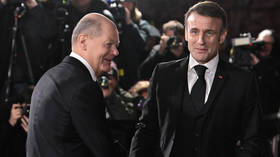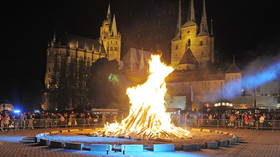Fyodor Lukyanov: Leaked German call exposes a very worrying fact about the West
The US-led bloc believes it’s infallible and that increases the chances of a calamitous mistake
In peacetime, when Russian experts regularly took part in pan-European events, this author’s favorite place was the Vienna Military Academy. Discussions there were a real pleasure.
Most of the audience were officers of the Austrian army, heirs to an impressive imperial school, capable of discussing with skill and intelligence subjects ranging from the intricacies of geopolitics and military strategy to the epistemological aspects of ideological confrontation. Adding to the charm of the conversation was the fact that for its participants, adorned with medals, axelbands, impressive chevrons and beautiful buttonholes, all this was akin to pure art. This kind of knowledge had no practical application in prosperous and neutral Austria, where the relevant department is called the Ministry of Defense and Sport.
The nostalgic memories were awakened in yours truly amid the excitement caused by an audio recording of a conversation between German officers about the prospects of using Taurus missiles to destroy the Crimean Bridge. Germany, the economic and political pillar of the European Union, is certainly not Austria, and the Bundeswehr, the modern incarnation of a long and rich military tradition, is not the Bundesheer. Nevertheless, the published transcript of the military dialogue makes one think about the correlation between military capabilities, the skill of their application, and the adequacy of political perception in contemporary Europe.
The emotions surrounding the leak are understandable: tensions are rising. But we have not learned anything fundamentally new from this episode. The participation of representatives of NATO countries in Ukrainian military planning and operational preparations has long been known. The only difference is that the Germans have been singled out – a new but expected twist. It is already clear that behind closed doors officers and generals are discussing the war and not humanitarian aid. Chancellor Olaf Scholz publicly and very firmly stated that he would not send missiles to Ukraine, while another part of the German political top brass made it equally clear that they disagreed with him on this issue. What was somewhat unexpected, however, was that the German military turned out to be in solidarity with those in favor of transferring the weapons in this debate, i.e. they are not worried about the risks of excessive involvement in the conflict.
That is the most interesting thing. The professionals who bear the brunt of a war do not usually become its instigators – that role is played by the politicians. External aggression is a special case, of course, but in other cases the military executes political decisions, and when such decisions are taken, it is not the business of people in uniform to discuss them. Even if they are not sure of the wisdom of the orders.
When it comes to hybrid warfare (for lack of another term, we will use this imperfect one), the structure of the system is broken. The involvement of NATO countries in the confrontation between Ukraine and Russia has been steadily increasing for two years, while the official disavowals have been just as consistent. We would venture to suggest that this is not some insidious plan or “strategic ambiguity” (as French Foreign Minister Stephane Sejourne suddenly stated the other day), but a lack of understanding of what is going on and, more importantly, what follows from it and where it is likely to lead.
At the turn of the 1990s, the leading Western countries came to the conclusion that the direction of development was so preordained that the costs associated with it could simply be neglected. It was part of the “end of history” mentality. And this was indeed the case until they came up against the main sources of these costs, i.e. states that could oppose anything serious to the point of blocking the whole movement. For twenty years, the Russian leadership has been trying (verbally, and then, one might say, manually) to make the Americans and Europeans vis-à-vis aware of the fact that certain steps they take will lead to corresponding responses, and that this is the logic of international politics. These warnings were ignored and the atmosphere continued to escalate. The result was February 24, 2022.
As we can see two years later, the transition of events to an armed phase has not brought about a qualitative change. Russia is now trying to use military force to force the West to rethink its 1990s approach. Moscow wants to show that the costs are so high that it is reasonable to think about a change of plan – in other words, to start a conversation with it about a different arrangement of the European security theater. But there is no counter-movement on the other side – no one is going to recognize the irreversibility of the transformation brought about by Russia’s military acquisitions. On the contrary, as the Russian side corrects the mistakes of the initial phase of the campaign and takes the initiative, the rhetoric in Western Europe and the US about the inadmissibility of Moscow’s victory in general is becoming more and more heartfelt and alarming.
Accordingly, the less hope there is of achieving what is desired by using Ukrainians as proxies, the larger the set of tools considered acceptable for use.
The revelations in Paris by Macron and his comrades that nothing can be ruled out, including the deployment of NATO contingents, should also be seen in this context. This is not yet a political decision, of course, but it is a clear extension of the limits of what can be on the table in principle.
In this context, the well-publicized conversation between German officers takes on added significance. As the leaks have made clear, the military is not assuming the role of a restraining and rationalizing force in the midst of the politicians’ euphoria, but is surprised by the indecisiveness of the head of government. Meanwhile, this is not an attack on their homeland, but a conflict involving a state that has no formal obligations to Germany (and other NATO countries). But involvement in this conflict brings us closer to a confrontation with a country that poses a serious threat.
What emerges from the conversation is that the German military is not thinking about the variants of developments that will follow the realization of the discussed scenario and does not take seriously the probability of a direct clash with Russia. That is, they assume that the hostilities will be limited to the territory of the conflict itself (Ukrainian-Russian). If French, Danish or American elites are frightened by the Russian threat, it is not because of the threat of an attack on their countries, but primarily because of the political consequences for the global position of the West. Indeed, a serious defeat of a country whose support has become a leading imperative for the entire Western community would be a severe blow not only to its prestige but also to its ability to pursue its interests in cooperation with the majority of the world.
The result is an explosive mix.
One component is the political elite, which considers the conflict to be existentially important, but does not have a thought-out strategy and tends to act impulsively according to constantly changing circumstances. And these circumstances can be of various kinds, including election campaigns in one country or another. High-profile statements and promises are often preceded by reflection on how they can actually be implemented and what the consequences will be. In this sense, there are reasons to believe that, for example, Macron’s statement about sending NATO fighters to Ukraine was made for the sake of a headline.
Another component is the military leaders, who agree with the existential nature of what is happening, but have no clearly defined framework for their actions. After all, they have not been given a formal mandate because of the nature of the campaign. Moreover, over the past decades, these military men had become accustomed (not as much as the regulars at the Austrian Military Academy, of course, but still) to acting more as competent commentators than as tacticians and strategists of real operations. And their experience is hardly applicable to today’s military-political actions. This is especially true of continental Europe; the situation in Britain and the US is more complex, but perhaps not qualitatively different.
The conclusion is that the risks of escalation are growing.
The categorical unwillingness to retreat is inherent in all participants in the confrontation.
But the ball is in the court of the Western camp, in which Western Europe, and France and Germany in particular, has surprisingly come to the fore.
It is important to take account of two circumstances.
The first is that it seems disagreements within the Western European community, aggravated by the general increase in uncertainty, are being resolved by increasing tensions, not reducing them. Simply lowering the intensity of the “Russian threat” hysteria will immediately expose many contradictions that are currently muted. Thus, the establishment prefers an escalation toward Russia to détente.
Secondly, the idea, which is gaining popularity in our country, that in order to break out of the vicious circle, the Western elite should be properly frightened by nuclear armageddon and then they will regain their will to negotiate, may have the exact opposite result. Today’s ruling elite is indeed qualitatively different from previous generations. First of all, it believes in a kind of dogma about the infallibility of the West, i.e. the certainty that any deviation from the ideological and political canon established after the Cold War will be a real catastrophe for the world. And since any compromise with Russia will be such a retreat, it is necessary to prevent it at all costs.
We are entering a dangerous period.
This article was first published by Russia in Global Affairs, translated and edited by the RT team








Comments are closed.